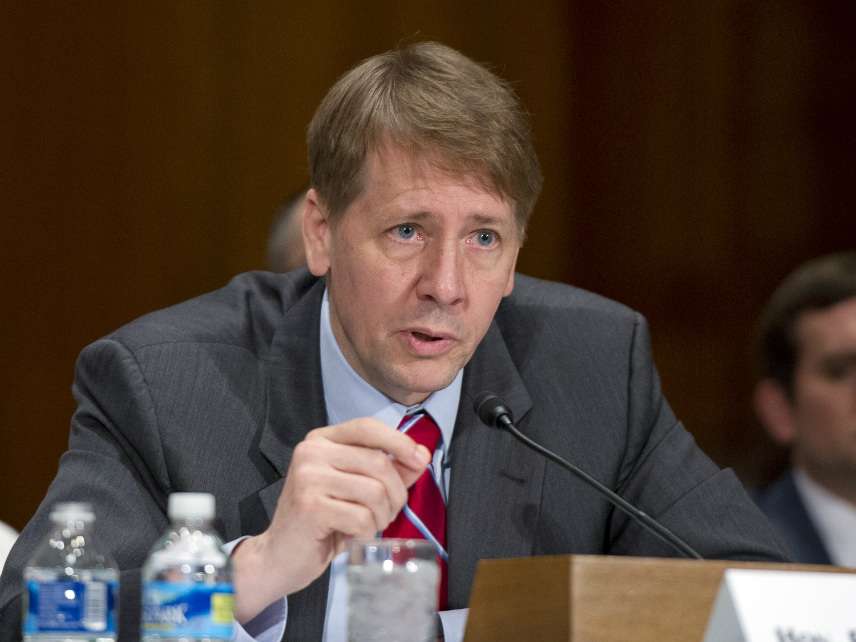The Consumer Financial Protection Bureau Is Unaccountable. Trump's Budget Tries to Change That.
The president's budget would give Congress more oversight over the agency's finances.

As a result of its unique structure, the Consumer Financial Protection Bureau (CFPB) is insulated from accountability by the democratically elected branches of government. While there are efforts underway to fix this, they have so far been frustrated.
Now the Trump Administration is taking another swing—this time through its proposed budget. Whether this effort will fare better than the others remains to be seen, but there is not much reason for optimism.
The CFPB's insulation from democratic accountability takes two forms. First, it's headed by a single director who serves a five-year term and can only be removed for cause. Most agencies with for-cause protection are led by bipartisan commissions, where the commissioners can at least check each other to a degree; an agency led by a sole director has the ability to pursue strictly partisan goals. While some administrations may seek to exploit this opportunity, the structure also limits a president's ability to offer necessary oversight over the agency, and could potentially allow a director from a prior administration to occupy the CFPB for the entirety of a new president's term.
Second, the CFPB's budget is not controlled by Congress. Instead of being funded by tax dollars subject to appropriations, the CFPB is funded from the earnings of the Federal Reserve System—in the amount the CFPB director thinks necessary (though capped at twelve-percent of the Fed's total operating expenses). The director has wide latitude to allocate those funds as they see fit.
This prevents Congress from using one of its main tools—the power of the purse—to check a director's actions. While the Senate gets a say on who the director is through the confirmation process, the House of Representatives has almost no leverage with the CFPB.
Yes, there is a yearly hearing where committee members get to yell impotently at the director, but the only check the House has is the Congressional Review Act, which allows Congress to undo a recently promulgated regulation. Neither of these opportunities provide control over enforcement actions or the director's priorities.
It seemed as though the best chance to reform the CFPB's structure was through a 2015 lawsuit brought against it by PHH Corporation. PHH argued that the CFPB's structure was unconstitutional because the director was unaccountable, and therefore the agency should be shut down. In 2016 a panel of the United States Court of Appeals for the District of Columbia Circuit agreed with PHH.
Importantly, however, the Panel declined to void the CFPB. Instead they sought to cure the constitutional defect in the statute by striking the director's for-cause protections. This would mean that the director served at the pleasure of the president, and given that then-Director Richard Cordray did not please President Trump, the expectation was that he would be promptly removed. The CFPB then appealed the decision to the full D.C. Circuit, which granted the appeal and vacated the panel decision. The full D.C. Circuit recently released
its opinion, which, contrary to an amicus brief filed by the Trump administration, held that the panel was wrong and that a sole director who could be fired only for cause was constitutional.
While PHH could in theory appeal to the Supreme Court, that seems unlikely due to other aspects of the case. So, where does this leave the CFPB?
For the time being, the director's for-cause protections appear safe. While there are other cases working their way through other circuits, those will, at best, take a while to resolve.
That brings us to President Trump's proposed budget. With the courts looking like an unlikely venue in the short term, the administration is turning to Congress. If passed, the president's proposed budget would place the CFPB under congressional appropriations in order to "impose financial discipline, reduce wasteful spending, and ensure appropriate congressional oversight."
The odds of this actually happening are slight.
It would require having the votes to overcome a potential filibuster in the Senate, and there appears to be little appetite among Congressional Democrats to enhance their own institution's power. As such, while we can hope for more structural accountability at the CFPB, we probably shouldn't count on it anytime soon.


Show Comments (17)